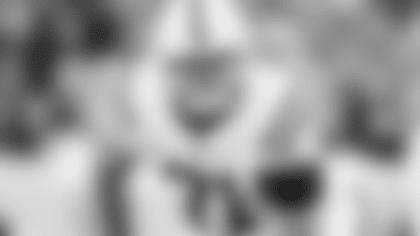INDIANAPOLIS — Indianapolis Colts tight ends coach Jason Michael recently sat down for a 1-on-1 Colts.com interview. What are Michael's thoughts on new free agent pickup Trey Burton, what makes Jack Doyle so special, his past experiences with Philip Rivers and more?
Here is that entire conversation, which you can also catch in its entirety above:
This has certainly been an interesting offseason. How have you and the tight ends been able to navigate a completely virtual offseason program?
Michael: "I think early on, I think all of us ... I don't know if it was a struggle, but it was just a learning process at the beginning. It was like everyone initially was like, 'What can we do? How much can we get out of this?' And I think the more this thing went on, the more we found creative ways to keep the players engaged, whether that was Frank (Reich) and the team meetings, whether that was Nick (Sirianni) and the different installs and the things we did in the offensive meetings, or when you got to the individual meetings of how we were going to be able to handle doing those different things, it was just finding different ways to (stay engaged), whether it was quiz guys, show film and all that, but it was productive. It was. We found different ways to do it, and we're still continuing to do some different things just to keep those guys into it."
And you have to navigate giving guys assignments and drill work to do, them sending videos back to you — which is often filmed by wives or girlfriends or friends during this pandemic.
Michael: "The different things that came back ... Different guys were creative with it, and they took it and kind of became competitive in their own way of, 'Hey, what can I do different?' whether it was a solo film shot or whether, like you said, it was a girlfriend or a significant other or wife or whatever it was. There were some that came back, and we definitely got some laughs out of as they were doing it and being productive. But no, that was the on-field stuff that we got, and guys really, really accepted it and took it as a challenge. You'd see guys in different parts of the country early on when it was still cold in Michigan, or whether it was rainy at Florida, you'd see guys running in the rain or whatever that was, but they really bought into it. I think it was the same thing for them. Initially, they weren't sure, but then just the guidance and stuff of what we were able to give them and what some guys did, and ... as coaches, you share all the time, and we were sharing from offense to defense, to special teams of different things they were doing, and just trying to be as productive as we could during this time."
Over the years, Jack Doyle has become a leader on this team, and somebody that not only the rest of your tight ends look up to, but really the rest of the team admires. What is it about him that's so special?
Michael: "Yeah. I think it first and foremost starts just the way he goes about his business. I know that's been said before, but it's the little things. Jack is always ... like you always hear, he's always there. He's always early. He's limited as a backup, more so on special teams; he's always going to special teams meetings. He just sets the example for young, old, no matter — veterans, whatever it is. And then secondly, I'd say just the football knowledge and acumen that he has of the game, and not only does he understand it and have a great feel for football, this system and that, but his willingness to be able to share that with other tight ends, other players in different phases of the game, whether it be special teams or whether it be a route or a certain block, but his willingness to help those rookies, those young guys. As a position coach, you sit there and you always talk about, 'Hey, it's (this)…' I can coach these (guys) as a position coach as much as I can, but until they see things done the right way, or until they get another perspective of ... I can tell whoever that rookie may be, Farrod Green coming in as a rookie free agent this year, I can tell him this many times, but until he sees someone do it the right way, or Jack may have a different twist on how he tries to explain it to him or make it simple, be more in depth with it. But one, just the way he goes about it and two, just his willingness to help those around him."
What is it about Doyle's game that makes him so effective? I'm not slighting him, but he's not the fastest, he's not the most athletic, but he's still really productive and he's made the Pro Bowl two out of the last three years.
Michael: "Well, I think it's the attention to detail. And you said it, he knows that. We joke about it sometimes, about whatever that may be, but the pre-snap understanding of, whether it be the coverage that it is, or whether it be the accelerated vision of knowing what's going to happen upfront, based on his pre-snap tells, of being able to play a step ahead, to be able to understand, 'Hey, this defensive end is going to play the C gap coming down.' Not to get into too many of those things, but he just has such a good feel of football, his film study, understanding what's going to happen. And then as a route runner, like you're getting into, just the physical (nature), of understanding how to set up routes, being able to use the weakness of the defense. It may be a Cover 1 look where the DB or the safety or the linebacker's going to stay outside leverage. He knows that, but to be able to set that route up on the stem of how he attacks that defensive player, to be able to beat him with his own leverage, is what he does so well. In terms of the details of not giving away things, being able to make all of his routes look the same, the top of his routes of being friendly for the quarterback, being in a position for the quarterback to give him a chance to catch the football and not allow the DB to make a play on it, or if it does, it's a broken-up pass and not an interception. And it's just that trust of knowing he's going to be in the right place at the right time, and then handle it the right way for the guy throwing him the football."
What about Mo Alie-Cox? What's next for him and his evolution as a football player? I think a lot of people can forget he's, what, four or five years removed from picking up the game for the first time having not played college football.
Michael: "The sky's the limit with Mo in my opinion, in terms of what he can do. Obviously people look at him and he kind of gets that label of that wide tight end, of being the big physical blocker. And he's continuing to grow in all areas of the game, but that's kind of where his role has been, and it's where he's been able to get into the position that he is now. I think just going forward, I think he did an unbelievable job last year of the things that he didn't do as much. Now, he caught balls two years ago, there's no doubt about that, but I think what he did from a route-running standpoint, in terms of detailing those things up, he did a really good job of that last year. Now it didn't always show, and there's times when, whether it was Eric (Ebron) or whether it was Jack that maybe overshadowed him in the passing game as much, but there's some things that Mo can do that … he's a big, big body. And when we can get the ball into his hands on the shallow cross routes and those things — and I'm not limiting him to just those routes — but he catches the ball well, and he's a big man to bring down. So I just think continuing to evolve as a run blocker, as a pass protector, and still continuing to do that, but at the same time, finding opportunities for him. I think the more opportunities he has, the more of an all-around guy he can be … but I don't put any limitations on Mo, and he continues to grow. And Mo is a very intelligent person, and he goes about his business. And if you tell him to do it a certain way, he's going to do it that way. I appreciate that from a coach, but he's one of those guys ... You go back to Jack; he's benefited from having a Jack Doyle in the room to be able to accelerate his game, the way he has in such a short time, and I think he'll continue to do that."
And Alie-Cox is a tough dude, too. I mean, he played a good part of last season with a broken thumb, and not a lot of folks knew about it.
Michael: "Yeah. I think that just says a lot about who he is. He goes to work every day and how he works, how he goes about it ... And he did. He did it on a play, and going back to it, it was one of those ... Certain parts of our game, we'll run a play and then we'll go to the line and run another play. And I knew something had come up, and Mo kind of gave me the, 'Hey,' as this thing comes over, and it just so happened to be a play that we were going to run at the line of scrimmage, and he looked over and just gave me this (look), so I didn't know what it was, but he stays in the game and then we get him out and he's like, 'Man,'" he said, 'I did something to my thumb.' Then it goes on. Obviously after the game, he felt that (pain), but it wasn't a harm to him to move forward, so obviously that was the first thing. In terms of those injuries, if it's something that can continue to hurt him, then it wouldn't have been the case, but no, I just think it speaks about the toughness and his commitment to the team, wanting to be involved, and wanting to be a part of why we're winning, why we're successful. And then it says a lot about him."
What will Trey Burton bring to the tight ends room? What's his skillset as he comes over in free agency?
Michael: "Yeah, I think it's noted and obvious: Coach Reich was with Trey in Philadelphia. And I go back to a couple of years ago when he was a free agent when he went to Chicago, and just loved what Trey brought to the game of watching him as a position coach. You usually watch those guys that are out there in free agency. I had a chance to spend a lot of time and watch Trey that year, and (he) ended up going to Chicago. But I think Trey is a very skilled route runner. He has some natural ability and a natural feel as a route runner, and that's what he has done. But I think if you go back just the things that he can bring all around, and in the tight end room, you're trying to find those different roles, and the more roles a guy has, the more opportunities he's going to get in terms of being able to do different things. But I just think with having three different types of guys with Mo, that — and again, you don't want to put labels because there's other things they can do — but in that wide position as an inline player, Jack has a little bit more of that, hey, all-around utility knife, can do a little bit of anything, and Trey is kind of that way too, but he's probably leaning a little bit more to the pass side of things as a route runner from the things that he's done in the past. Now, he's good. There's going to be times when he's going to be in a position to block and do those things, but I think Trey just brings that element of that matchup guy that allows us ... I think in football these days, there's a couple of positions that give you a chance to create matchups and dictate to the defense, and tight end is one of them, to where, hey, if you have a guy like Jack, a guy like Trey, that you can put two or three different tight ends out there, how are they going to play? Are you spread out? Are you in tight sets? And I think Trey just adds another element of that, and another piece that allows us to dictate to the defense."
Is that the biggest thing? You brought up something that is very important — no matter who's on the field, you don't want to tip your hand to the defense. Is that the goal, to keep things fresh and to have multiple identities within your tight end room when they're on the field?
Michael: "For sure. And I think that's any position, but especially there, I think you'd probably see a little bit more 12 personnel, 13 personnel with two and three different tight ends on the field. And we're always looking at that. We're always trying to marry things. And if we do have a high tendency of Trey being in a position where he's doing this or Jack doing that, you're always trying to counter them and use that against the defense. They see that too. Those guys are smart, but I think as much as anything of being able to give the same sets, be balanced, run, pass, play action, and all those things out of it, and then how do defenses want to play you? Do they want to stay in base defense when you put two and three tight ends, or do they want to go to their sub package and go to nickel? Do they treat Trey or Jack like a receiver and say, 'Hey look?' If that's the case, then that's where we've got to be able to take advantage of things and run the football. And that's always the game you're trying to play, with those multiple tight end sets of, 'Hey, how's the defense going to play us? How are we going to counter that?' To be able to have both sides of that, to, 'Hey, if they want to play base, we're going to do this. If they want to play sub … .' To have those answers."
You were with Philip Rivers for three years in San Diego, and now he's the Colts' quarterback. In your experience, how does he make tight ends better in the offenses that he's in?
Michael: "Yeah, I was (in) a couple of different systems, so I was there in '11 and '12 when Norv Turner was the head coach, and then I had a chance (after) — that's when I was with Coach Reich and with Nick, with Coach Sirianni, and we were all together in '13. And the one thing I've always said about Philip as a quarterback is everybody always thinks about, hey, finding the open receiver, finding this, and he does that so well. In my opinion, Philip maybe as good as anybody, eliminates things as well as anybody. When things aren't what they're supposed to be down the field with the receiver, down the field with the designed route, that coverage may be different than you thought, or hey, the guy was covered, or it just doesn't look right, the protection is starting to break down, I think I've always looked at him as the best at eliminating. And because of that, there's two positions that benefit from that, and that's the tight ends on the underneath, checkdown type things, and that's the running backs. And so when things aren't what they're supposed to be, he's so good at being able to get the ball on the underneath checkdown, over the ball, pivot route or whatever it is, or the quick swing or read route or whatever that may be from a back. And there's going to be things for tight ends that we're going to design for all of these guys down the field. But there's a lot of times when they're on the secondary or third part of a route, or trying to control the underneath part of the coverage and whatever that may be, and when it doesn't look good, he's so good at getting it down. And that's where always in the past, tight ends and running backs that have played with Philip have caught a lot of balls."
Now, this is not a Colts question per se, but it's a Philip Rivers question. What was so special about his duo with Antonio Gates over the years?
Michael: "Yeah, I think it's a little bit what I said there, in terms of just the trust and of where Antonio was going to be, of being able to get a number of just those catches underneath, and Antonio, I'll always say this, short-area quickness and things like that, of being able to get open versus safeties and linebackers, I've never been around a more explosive person. He played basketball on the football field, and understood how to create space. And he was so good at that, and that trust and that me-to-you you factor that the two of those guys had was unbelievable. A lot of that happened underneath — Philip trusted and knew Gates was going to win the majority of the time, even when he was covered. I think just that trust and the time of (being together) that they did over the years, and then obviously on the other end of it making those plays and when it was a tough situation, Antonio came down with it. But I think that you'll see that's what is going on right now in terms of, i's a different offseason, but I know Philip is going to work as hard as anyone doing what he does. I think it's been noted over the last few days, he's moved into town. There's going to be times ... They're going to do what they can, and there's a lot of time between now and when we kick it off in Jacksonville. I think whether it's a tight end or with the receivers in the backs, he's going to build that trust and do everything he can between now and then. Now, is it over the course of 10, 12 years? No, but he's going to find ways to expedite that and speed it up. But I just think those two have had such a good feel. There's so many stories that you could go back, but it was ... we had certain combinations to where they could just look at each other. They'd played with each other for so long to, whether it was an outbreak or I wanted to change it to an end break or vice versa, they could look at each other and just know and say, 'Hey, look, I know what the leverage is. Don't ask me to run a corner route when this guy's outside, let me run the post.' And they could just look at each other and have such a good feel. And that's going to come. And then Antonio was smart in that way, that the tight ends in this system here like we said, between Trey and Jack and Mo, those guys are going to get a feel for it, and Philip's going to make that happen."
So what you're saying is maybe by the midway point of the season or season's end, Jack Doyle and Trey Burton can have this unspoken language on the field with their quarterback?
Michael: "Yeah, I think that's going to happen. I think they're going to have enough reps, and those things are going to happen, whether it's between now and the time we get to training camp, that the reps that they're going to get in training camp, and then just as the season goes, it's going to grow. And those guys have played a lot of football. Philip's played a lot of football. It's not like it's the first time that they've done that."
Final thing: we've been talking about your career in the NFL. You've seen a lot of good tight ends in your day, whether it be Antonio Gates, Delanie Walker when you were with the Titans, Jermaine Gresham with the Arizona Cardinals. In your eyes, what separates the great ones at tight end from the rest of the pack?
Michael: "Well, just in terms of what I mentioned before, the position of tight end has changed a lot over the years in regards to the separate roles, so (it's) finding the different guys. And I think when you find guys that can play and wear multiple hats and have more of those roles, those are the guys that are easier (to excel). To the question you asked, you don't have to sit there and say, 'Anytime this guy's in this, this is what he's doing,' because we can do different things. You can put Delanie Walker in the same position you can put Antonio Gates, those guys in the same position and run a route with them, and at the same time, be able to block at the point of attack or backside. Now, are you doing that a lot? No, but being able to handle those multiple roles. And then I just think the obvious of the athletic ability and the explosiveness at that position, because the majority of the time, those guys are going to get a linebacker or a safety. And when those guys can win the match-ups with those guys, or when they can create situations where defense has had to sub even other guys, either one, they're winning against those guys or two, they're putting a lesser defender on someone else, that's going to reap the benefits of that. I think that's what you're always trying to do, but there's different ways. Like I said, Antonio, the explosion and the ability to separate was unbelievable. Delanie was a very fast guy that could get going and run away from people like not many. Vernon Davis, back when I was in San Francisco, was faster than all of them. You can play Tampa 2 and run a MIKE linebacker down the middle of the field, and he was still going to beat that guy. And Delanie and Vernon were together, so I was with those guys twice, but yeah, they're all unique in their own ways, but it's about, I think, trying to find their strengths like any position, and play to their strengths and allow them to do what they do."














